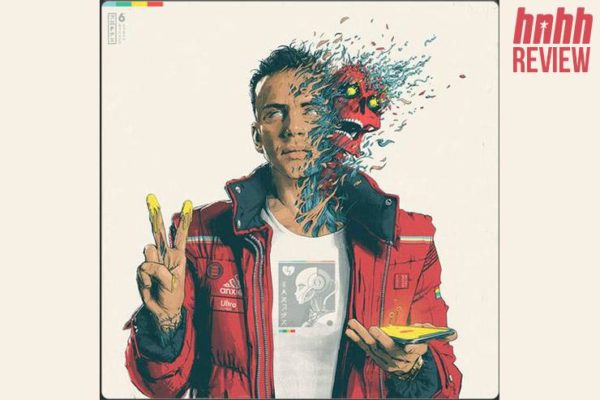First, though— to all the people who are saying they wish the whole album sounded like Lost in Translation and Confessions of a Dangerous Mind— that would not be a good album. Logic was smart to use these two tracks as bookends because the space in between keeps them sounding fresh. If the whole album were in this vein, it’d sound like the Jack Johnson equivalent of rap— laid-back to the point of anesthetized.
Confessions of a Dangerous Mind is exceedingly well-assembled. It’s remarkably competent. Logic’s proficiency is unparalleled. These are praises, but there’s a buried criticism— Confessions of a Dangerous Mind sounds like the product of book learning. Let me explain: if you took someone really bright and capable and challenged him to make an album that would be lauded by critics and laymen alike— he’d create this album. You can see the strategy that underpins its design: study the history of rap and address societal issues. Logic namechecks Rakim, NWA, André 3000 and addresses the poisonous invisible hand of social media, Charlamagne’s controversy profiteering, and the media’s opportunistic dissection of Lil Peep’s death. He’s included a few flex tracks (“Out of Sight”, “Still Ballin”, and “Icy”) because that’s part of any good album— it’s a great recipe.
A tendency to be derivative is Logic’s Achilles heel. The problem is built into the image he’s created: Bobby styled himself “Young Sinatra” and “Bobby Tarantino.” He interpolated Rat Pack into Rattpack. All of these mini-personas can be separated into discrete parts in a way where you can see the strings and the illusion of an artist is lost. Instead of creating a richness on par with Slim Shady/Marshall Mathers/Eminem, what Logic has set up is a construction where his influences overpower his individuality. Take his recent novel Supermarket, for example. The cover color scheme and typeface were stylized like the Pulp Fiction poster. The plot was Fight Club. There was a character named Edward Nortan. When allusions are overused— which Logic does in both his novel and his music— the referenced works can eclipse the new art.
It’s hard to overlook the influence overload on Confessions of a Dangerous Mind. The sheer number of Kanye references is overwhelming. On “Wannabe,” Logic addresses the mental anguish of being famous, “Why you think Kanye crazy?” On “Pardon My Ego,” Logic correlates Kanye’s bipolar disorder with his genius: “I ain’t bipolar Kanye make me wish I was cause that level of genius the meanest.” On “Still Ballin,” first there’s a reference to My Dark Twisted Fantasy, “I’m a monster like Nicki on Twisted” and then a general Kanye tribute, “Killing these beats like Kanye do, like Yeezus believe us.” This over-reverence reads as reactionary to mumble rappers’ irreverence.
It’s as if Bobby assembled all of the critiques of the new generation and confronted each of them in turn. Mumble rappers have no respect for the greats— Logic, in contrast, pays homage all over the album. Mumble rappers glorify drugs so Bobby does a sardonic rendition of said glorification (“Cocaine”). Logic condemns the pernicious pitting of rapper against rapper and proves that he is not so prideful that he can’t express appreciation for his contemporaries (“Mama/Show Love”).
This is the meanest thing I’m going to say. “Cocaine” feels like a poor man’s “1985 (Intro to ‘The Fall Off’).” After complaining that the surefire way to get streams is to rap about drugs, Logic says, “They wanna see a black man fall down. They wanna see a black man lose. They wanna see a black man fall down. They want more blacks to sing the blues.” The shot at mumble rappers is clear. Logic implies that they’re playing into—and reifying— exploitative stereotypes. On KOD,J. Coleaddresses the same issue, but he says it in a less preachy, more observant, and more complex manner. There’s more than simple anger in J. Cole’s advice— there’s derision (“I’m hoping for your sake that you ain’t dumb as you look”) and patronization (“I’m fucking with your funky little rap name”) that makes the message sting rather than just complain. “Cocaine” is one note. It’s simple to a fault— which might be excusable if it were at least original, but someone else got there first.
Sometimes it feels like Logic uses his platform to list the things he likes. And he believes that citing The Orville or Keanu Reeves somehow elevates his own work by proxy. This lazy clout-by-association reminds me of the “I like ‘The Office’” video that maligns people who think liking the series substantiates the existence of a personality.
Confessions of a Dangerous Mind is named after a George Clooney-directed movie, which announces its dependence on references. To give substance to an allusion requires a great deal of originality so that the referent does not supersede the relevance of the reference. Here’s an example. On “Keanu Reeves,” there’s nothing to get. So long as you are vaguely familiar with The Matrix, you’re in on the joke. It’s a throwaway reference because the song doesn’t carry the theme of The Matrix franchise or Keanu’s career throughout. On “Still Ballin,” there’s a lyric about The Fresh Prince of Bel-Air: “Money like my last name Banks. Bitch, you Jeffrey.” It’s clever. It makes you think of the television show and then it’s over. After “No Role Modelz,” it’s impossible to hear a Fresh Prince reference and not think of J. Cole’s “First things first rest in peace, Uncle Phil.” That entire song evolves from the strength of its first line, weaves in multiple relevant references to the show, and becomes something greater than a charming, brief pop culture reference. “No Role Modelz” is a masterclass in how to use an allusion to bolster original work. Logic hides behind his allusions and uses them to prop himself up rather than exploding them out into something high concept.
There’s something formulaic about Confessions of a Dangerous Mind. Every song is a safe combination of tried and true and topically relevant. There’s a repeated sequence of: movie namedrop, pop culture reference, flow change, polyptoton. Even the small gimmicky things feel very calculated. In “Pardon My Ego,” I can’t help but like the vocal cut off at “Like when you in the studio and the vocal get cut off.” Logic knows it plays well. The album is designed to be slick, likeable and risk-averse.
The fact that Logic sticks to a blueprint is not a sin. It’s a winning blueprint and what he does is really difficult to do well— but it’s not innovative. Bobby stays within a prescribed zone of high performing topics and techniques, which means that appreciating this album is a matter of tempering expectations. If we want to see where rap is going, we probably wouldn’t look to Logic. We’d look to Logic to examine a refined version of an extant style. And he’s at his most athletic on Confessions of a Dangerous Mind.
The album’s greatest feat is that it checks all the boxes. Logic takes down his critics. He does voices. It’s lyrically mesmerizing and a definite win for purists. It’s a mature version of the previous ‘positivity and love’ vibes. In fact, Logic has more of an edge than ever— there’s a scathing world-weariness in his frustration that suits him well. On “Homicide,” he says “fuck rap”—which he also said on “Yuck” from Bobby Tarantino II—but this time it’s much more convincing. There’s a darkness that wasn’t present on earlier albums when Logic grazes territory that sarcastically subverts his previous anti-suicide message on “Wannabe” (“I don’t get likes like they get likes so I’m gonna slit my fucking wrist”) and “Homicide” (“Leave a suicide note, fuck that”). It’s gratifying to see ideas from previous albums continued, like his ambivalent relationship with fame that began on “Buried Alive” from Under Pressure.
There’s nothing wrong with book learning. The album is still very much effective– but it’s the difference between watching Federer and Djokovic play. Both are technically gifted and talented beyond comprehension. But while Djokovic is a book learner, Federer is post-proficiency. Like a Chinese gymnast or a Russian ice skater, Logic has all the ability in the world but there’s a dearth of unpredictability that he can’t overcome.








